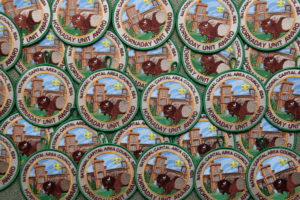 Congratulations to Pack 1530 in Powhatan District for being the first unit to earn the new NCAC Hornaday Unit award patch.
Congratulations to Pack 1530 in Powhatan District for being the first unit to earn the new NCAC Hornaday Unit award patch.
William T. Hornaday awards are given for distinguished service to natural resource conservation. The Hornaday Unit certificate is awarded to a pack, troop, crew or ship of five or more Cub Scouts, Scouts BSA Scouts, Venturers, or Sea Scouts for participating in a substantial conservation project. At least 60 percent of registered youth must participate. The Unit award may be awarded for participation in a Hornaday Badge or Medal project, for participation in an outside organization’s conservation project, or for a standalone project the unit planned and conducted on its own.
 NCAC developed this new patch for the participants in Hornaday Unit award projects. It features the Smithsonian Castle and a bison because William T. Hornaday, a taxidermist for the Smithsonian, is credited with helping to prevent the extinction of the America bison.
NCAC developed this new patch for the participants in Hornaday Unit award projects. It features the Smithsonian Castle and a bison because William T. Hornaday, a taxidermist for the Smithsonian, is credited with helping to prevent the extinction of the America bison.
Pack 1530 earned this prestigious conservation award by participating in Boy Scout John Foong’s Hornaday Badge project to remove invasive plant Japanese stiltgrass at Frying Pan Farm Park. Japanese stiltgrass is invasive because it is non-native, grows aggressively, and crowds out native plants. Pack 1530 Cub Scouts, scouters, alums, and family members helped over 100 other volunteers remove 110 large garbage bags of stiltgrass. In the spring, volunteers will help plant native shrubs and perennials on the site where the stiltgrass once lived. This project site is part of Fairfax County Park Authority’s Invasive Management Area (IMA) program.
For more information about Hornaday projects, please go to the NCAC Hornaday page (https://www.ncacbsa.org/advancement/awards-and-recognition/hornaday/). We strongly advise any scout interested in a Hornaday project or any unit interested in a Hornaday Unit award to identify a Hornaday Adviser to guide you through the process.
 “Unusual prizes are won only by unusual service.”
“Unusual prizes are won only by unusual service.”
– William T. Hornaday
“Very special thanks to our local Cub Scouts who participated in clean-ups. Your efforts will help the land to heal and provide a fresh landscape for native plants and animals to live. When we all pull together great things happen. May you all continue your wonderful work in conservation and thank you all so much from your friends at Frying Pan Farm Park.”
– Patrick Macnamara, land manager at Frying Pan Farm Park

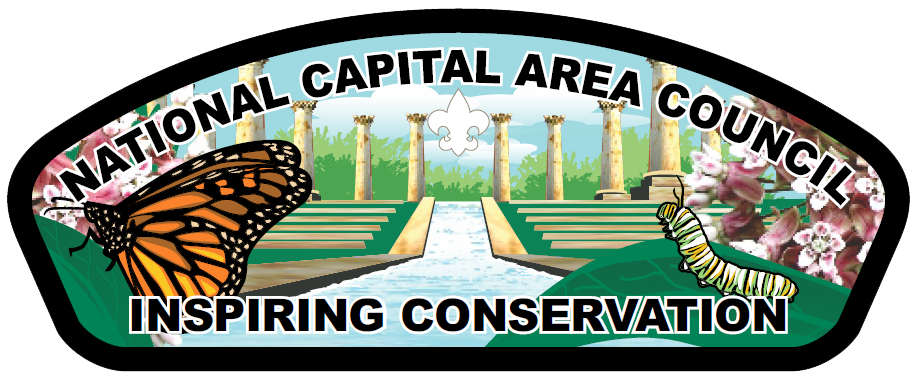 On Saturday, February 2nd, the National Capital Area Conservation Committee kicked-off the 2nd year of Milkweed for Monarchs, Inspiring Conservation in Scouts and Their Families. Hosted by George Washington University. Scouters and their families learned from national monarch expert, Pete Berthelson, about growing milkweed and providing habitat for monarchs and other pollinators. He taught about providing pollen and nectar throughout the entire year, options for growing milkweed and native flowers from seed, the importance of seed-soil contact, and our role in making a difference. The event drew 400 Scouters to GW and is sure to again inspire Scouts to action.
On Saturday, February 2nd, the National Capital Area Conservation Committee kicked-off the 2nd year of Milkweed for Monarchs, Inspiring Conservation in Scouts and Their Families. Hosted by George Washington University. Scouters and their families learned from national monarch expert, Pete Berthelson, about growing milkweed and providing habitat for monarchs and other pollinators. He taught about providing pollen and nectar throughout the entire year, options for growing milkweed and native flowers from seed, the importance of seed-soil contact, and our role in making a difference. The event drew 400 Scouters to GW and is sure to again inspire Scouts to action.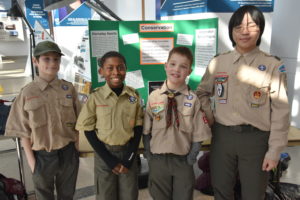 The following observations from the February 2nd Milkweed for Monarchs Kick-off event were written by Owen M., a Webelos in Pack 1188, and submitted by Brian McDougal. Thank you, Owen, for supporting this important conservation effort, and for your reporting on this event.
The following observations from the February 2nd Milkweed for Monarchs Kick-off event were written by Owen M., a Webelos in Pack 1188, and submitted by Brian McDougal. Thank you, Owen, for supporting this important conservation effort, and for your reporting on this event. 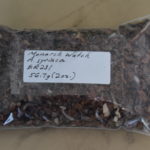 Hi my name is Owen, I am a Webelos Scout. I went to the Milkweed for Monarchs 2019 kickoff event on February 2, 2019. The National Capital Area Conservation Committee held the event in Washington DC at George Washington University. There were a lot of Scouts and Scouters there.
Hi my name is Owen, I am a Webelos Scout. I went to the Milkweed for Monarchs 2019 kickoff event on February 2, 2019. The National Capital Area Conservation Committee held the event in Washington DC at George Washington University. There were a lot of Scouts and Scouters there.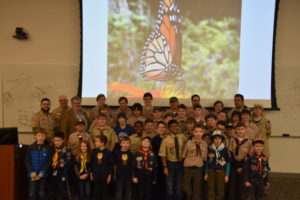
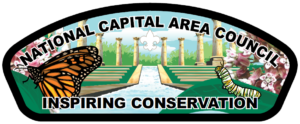 On Saturday, February 2nd, the National Capital Area Conservation Committee will kick-off the 2nd year of Milkweed for Monarchs, Inspiring Conservation in Scouts and Their Families. This year’s program is again presented by the National Capital Area Council, Boy Scouts of America, and will be hosted by George Washington University.
On Saturday, February 2nd, the National Capital Area Conservation Committee will kick-off the 2nd year of Milkweed for Monarchs, Inspiring Conservation in Scouts and Their Families. This year’s program is again presented by the National Capital Area Council, Boy Scouts of America, and will be hosted by George Washington University.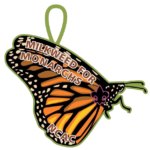 The youth-friendly presentation is sure to inspire attendees to take action to help save the vanishing monarch butterfly through the building of a healthy and sustainable pollinator habitat. In addition, Scouts and others who attend will receive a free Milkweed for Monarchs patch, plus an easy-to-use seed packet of milkweed and other native, nectar-producing plants that nourish monarch caterpillars and butterflies throughout the growing season.
The youth-friendly presentation is sure to inspire attendees to take action to help save the vanishing monarch butterfly through the building of a healthy and sustainable pollinator habitat. In addition, Scouts and others who attend will receive a free Milkweed for Monarchs patch, plus an easy-to-use seed packet of milkweed and other native, nectar-producing plants that nourish monarch caterpillars and butterflies throughout the growing season.